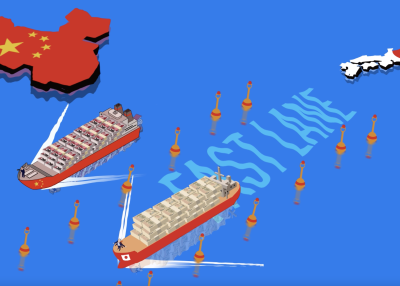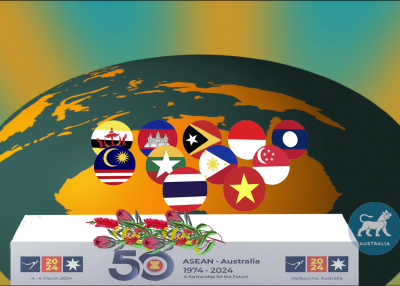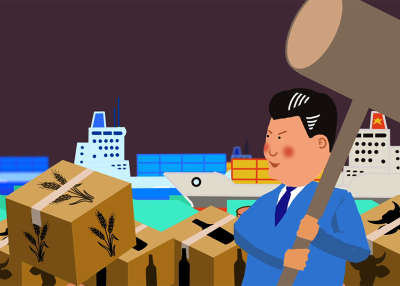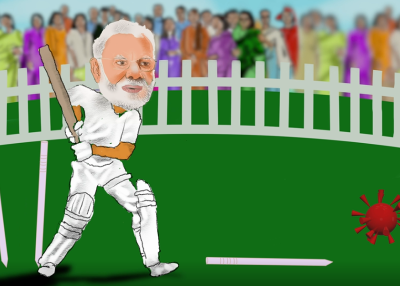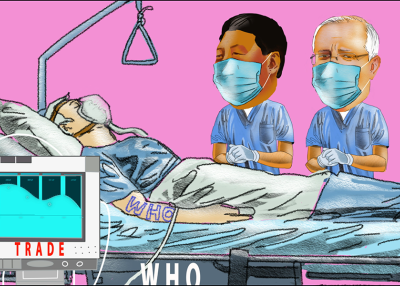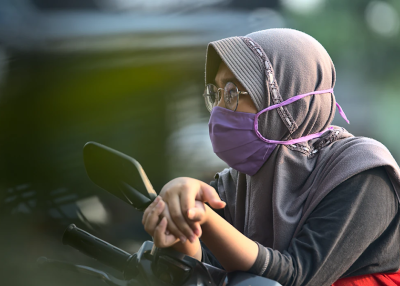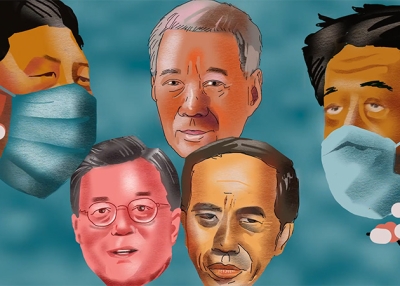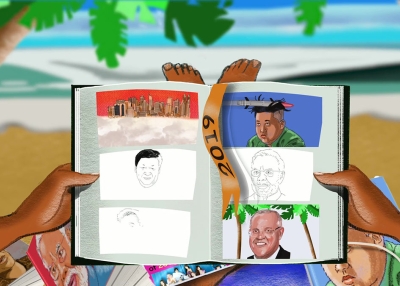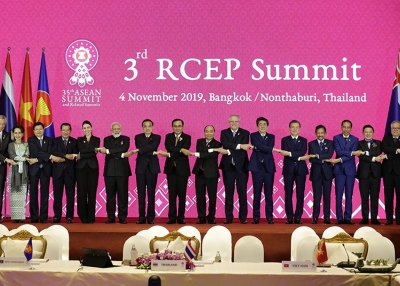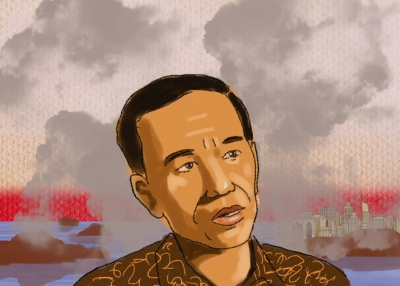Briefing MONTHLY #12 | December 2018
India and Indonesia business | Summit watching | Reporting Asia
India high tech. Animation: Rocco Fazzari. View it here.
PUTTING A INTO B & C
It says a lot about Australia’s relationship with two of its most diverse regional neighbours – Indonesia and India – that the state of play is still frequently described by two hackneyed, but nevertheless snappy, exercises in alliteration. From newspaper stories to academic reports, the phrase “beef, Bali and boats” is regularly used to capture the challenges of living with Indonesia. Meanwhile “cricket, curry and the Commonwealth” remains the fall-back prism through which to view the relationship with India. These old maxims inevitably draw groans of exasperation from the cognoscenti and declarations they will never be heard again … until a new speaker takes the lectern at the next event. And it was as ever so at the recent bilateral business conferences on Indonesia and India on the Gold Coast and in Sydney, where the three Bs and Cs rolled off tongues with the usual mix of irony and enthusiasm.
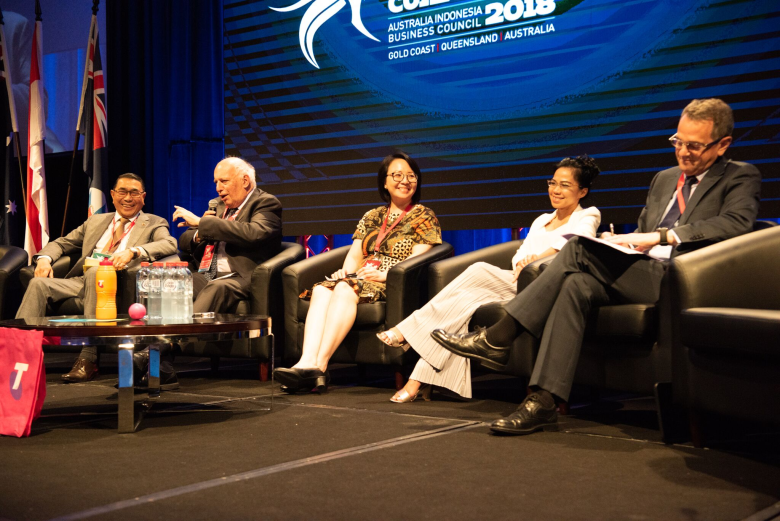
Panellists at the Australia Indonesia Business Council conference. Picture: Nina Williams
But it was interesting to observe that “cricket, curry and the Commonwealth” got much more airtime in Sydney than “beef, Bali and boats” got on the Gold Coast. This may be partly explained by the relative newcomer status of Prime Minister Scott Morrison and President Ram Nath Kovind at the India Business Summit (run by the Department of Foreign Affairs and Trade, The Australian Financial Review and Deloitte) compared with the greater familiarity of former Trade Minister Steve Ciobo and current Investment Minister Tom Lembong at the Australia Indonesia Business Council annual conference. Or, it may say something deeper about the state of respective relations with the two countries which are crucial to any sort of China plus economic strategy for Australia.
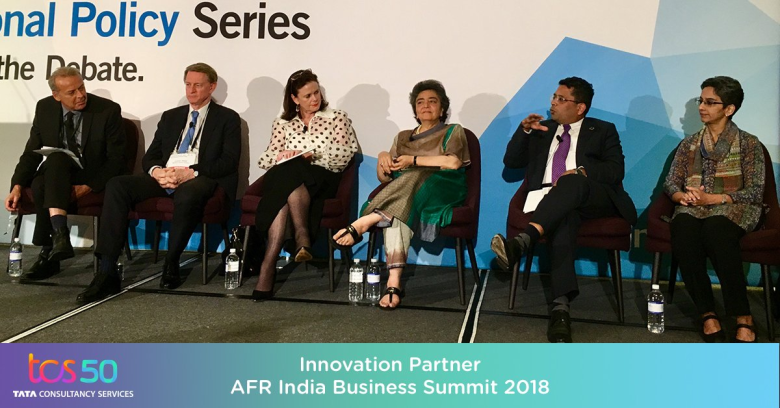
Here’s what the conferences revealed about the relationships.
Education: This is now seen by many as the frontline of a new business relationship with both countries with the Indonesia trade agreement meant to give Australian education and training institutions preferential access to Indonesia and universities trying to offset dependence on China for foreign students by recruiting in India. In country vocational training is seen as the big growth opportunity in both countries with somewhat greater enthusiasm about how this can gain momentum in India.
Resources: While individual companies such as Nusantara Resources have a positive story to tell about Indonesia, there is almost universal dissatisfaction over the nationalistic and changing approach to resource extraction there. Meanwhile resource exports dominate trade with India and there is growing enthusiasm about the opportunities for exports of Australian expertise in mining engineering and technical services as India rationalises its own statist mining industry.
Agribusiness: Australian food producers are trying to find ways to integrate with supply chains in both countries to overcome their fears about food security. GrainCorp trader Nick Poutney says the India business is too transactional and suggests the future is for Australian suppliers to build transparent good storage facilities in India to become a back-up suppliers. Indonesian feedlot investor Troy Setter says the trade deal is exciting because it will allow him to train more Indonesian staff in Australia spreading social benefits to Indonesia as well as Australian meat.
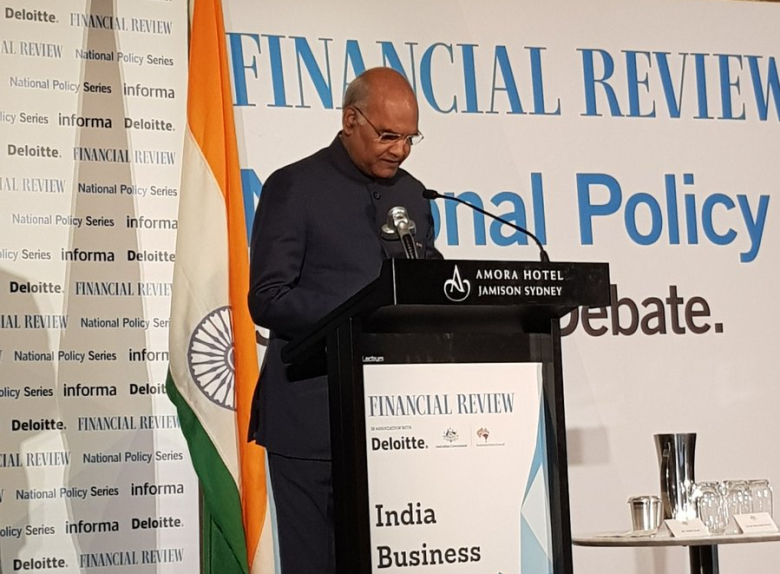
Indian President Ram Nath Kovind speaking at the India Business Summit.
Infrastructure: New projects are being implemented faster in both countries than ever before in a significant boost to business confidence. Macquarie Bank’s investment of $3 billion in about 50 mostly transport and energy projects in India has elevated its attractiveness to other Australians. But the World Bank is backing Indonesia’s ambitious tourism capacity growth with its biggest infrastructure lending in this sector since it helped create Bali’s Nusa Dua in the 1970s.
Trade deals: The Indonesia-Australia Comprehensive Economic Partnership Agreement (IACEPA) is still tracking towards signature but may not be ratified until after elections in both countries. And business is proceeding on the assumption it will be signed. The Comprehensive Economic Cooperation Agreement (CECA) with India is moribund with both countries putting their effort into the Asia wide Regional Comprehensive Economic Partnership (RCEP) agreement. The Federal Government has backed an alternative trade liberalisation-lite India Economic Strategy and the Labor Opposition says the same sort of strategy is needed for Indonesia.
Economic reform: India has the lead here with big headline grabbing initiatives including a consumption tax, a new bankruptcy code and demonetisation to force tax compliance. Indonesia is struggling to cut through with a series of much more frequent deregulation packages which leave questions about implementation.
SUMMIT WATCH
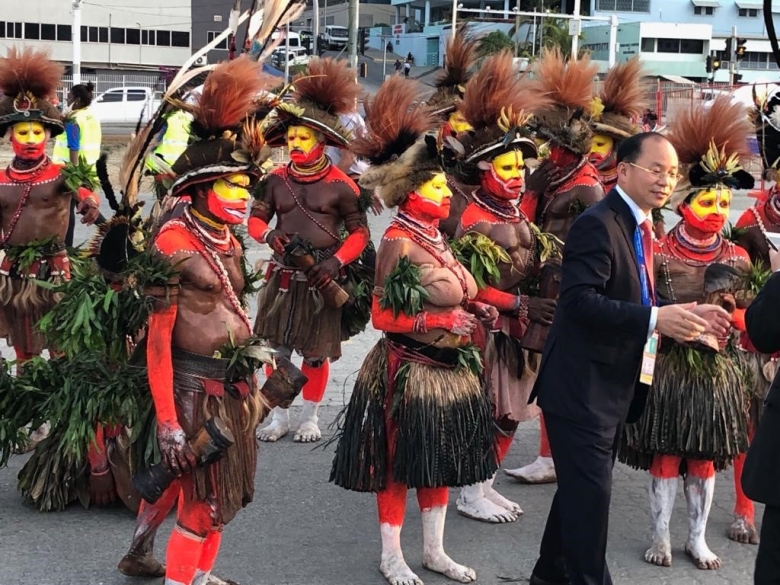
Meeting the neighbours at APEC. Picture: Philipp Ivanov
The summit season was disrupted by the failure of Asia Pacific Economic Cooperation (APEC) group leaders to produce their traditional statement in Port Moresby amid US-China tensions. But here’s what else happened.
Trade: Ministers from the 16-member Regional Comprehensive Economic Partnership (RCEP) group meeting in Singapore put a brave face on their latest failure to complete the deal. With only seven chapters out of a planned 18 finished and elections in several members early next year, the latest 2019 completion promise looks challenging. But Asian Trade Center director Deborah Elms is still optimistic about RCEP.
ASEAN: The ASEAN chairmanship has now shifted from Singapore to Thailand, which has its own big plans for the year ahead, but first has to navigate an election and return to democracy early next year. Cooperation on building smart cities was a feature of the ASEAN Leaders Summit. Thitinan Pongsudhirak says in the Bangkok Post that ASEAN is more relevant than ever amid the growing US-China rivalry.
EAS: The meeting of the region’s peak group the East Asian Summit in Singapore was overshadowed this year by the showdown between Chinese President Xi Jinping and US Vice-President Mike Pence at APEC in PNG. It is now 25 years since Asia tried to create a regional security body with the under-performing ASEAN Regional Forum (ARF), which in effect then became the forerunner to the EAS. With the EAS overshadowed this year it is timely that the Council for Security Cooperation in the Asia Pacific has devoted its annual review to the state of play with regional security architecture 25 years after the ARF.
Aid: Australia will commit $25 million next year to a plan to provide electricity to 70 per cent of Papua New Guinea by 2030, in partnership with Japan, the US and New Zealand. The project appears to draw heavily on this work by Port Jackson Partners for the ANZ Bank in 2015. This Bluenotes article by ANZ PNG chief Mark Baker examines how the project might proceed.
Indonesia: Indonesia ratified seven trade deals as a summit season sweetener in contrast to the stand-off with Australia. But they generally have a lower standard of economic integration than the Australian deal.
Defence: The US has joined Australia in refurbishing the Lombrum naval base on PNG’s Manus island leaving questions about whether this will curtail or fuel China’s aspirations for its own regional naval facility. Sam Bateman cautions against overhyping the base and ignoring the local communities.
PNG: Prime Minister Peter O’Neill simply ignored the tensions between the superpowers that prevented an APEC statement being released in this alternative Chairman’s Statement. But development economist Stephen Howes laments PNG’s lost opportunities from the Summit.
NEIGHBOURHOOD WATCH
A fiery relationship between the US and China. Animation: Rocco Fazzari. View it here.
THE OTHER SUMMIT
It is hard not to see the US-China trade truce on the sidelines of the Group of 20 Summit in Argentina as a story of two different perceptions of time. A Twitter-driven US President now has three months in which to claim a daily victory and a historical pantheon-driven Chinese President can continue to gamble that time is on his side. Even the apparent differences in the perception of what was agreed by both sides may well yet consume the 90 day truce period.
- Asian Trade Center director Deborah Elms says three months is not long enough to really resolve tensions between the so-called G-2 of China and the US.
- Former Indian central bank chief (and now US-based economist) Raghuran Rajan says the only workable solution can come from involving other major countries in the negotiation.
- American Enterprise Institute resident scholar Claude Barfield sees Donald Trump as the “Neville Chamberlain of trade” for yet again caving in to China.
NO MARDI GRAS
Taiwan’s local government elections have not only been a setback for the pro-independence Democratic Progressive Party President Tsai Ing-wen with the DPP losing half its seats at the mayoral level, this result has given the more pro-China Kuomintang (KMT) a faster than expected revival of fortunes which could play out as a diplomatic win for China. But the election has also proved a setback for Taiwan’s role as a more progressive Asian society with a referendum endorsing traditional marriage likely to prevent the legalisation of same sex marriage following a favourable court ruling which raised hopes for change. Thailand may now become the pacesetter on gay marriage in Asia with the military government moving to allow same sex civil unions as it seeks to soften its image ahead of next year’s election. But Thai human rights advocates are unhappy the new law will still prevent gay couples from legally raising children.
MAHATHIR WATCH
Watching one of modern Asia’s more mercurial strongmen try to claim a new-look place in history since Mahathir Mohamad returned to power in Malaysia has been one of the most fascinating stories in the region this year. How he tolerates the new media freedom he encouraged after the election will be an emblematic test. And it could have much broader implications in places like the Philippines where the longer standing free media is under new pressure. This Nikkei Asian Review article details a substantially liberated Malaysian media which, nonetheless, still faces 35 laws which could be used against it. But for a real insight into Malaysia’s transition don’t miss Mahathir’s fascinating interview with Eddin Khoo in Mekong Review (pay-walled), which itself is a testament to the thirst for media freedom in South-East Asia after three years of plucky publication.
ASIAN NATION
The Asian Hurdle. Animation: Rocco Fazzari. View it here.
REPORTING ASIA
The decline in original reporting on Asia by Australian journalists has played a significant role in a major donation to create a new journalism center in Sydney. Philanthropist Judith Neilson will commit at least $100 million to a planned Judith Neilson Institute for Journalism & Ideas to encourage quality journalism in Australia and the world through education and grants and by hosting lively events on the big issues of the day. “Asia will increasingly be a source of breaking global news and there is a need for informed, intelligent reporting and commentary on the region,” Neilson said. “My hope is that this new Institute can play a role in preparing Australian journalists for an exciting but more complicated and challenging future.”
IMMIGRANT NATION
New long-term research from the Scanlon Foundation has disputed the idea that Australians are shifting sharply towards opposing immigration. The research shows that only seven per cent of people regard immigration as their most important issue and only 14 per cent disagree with the idea that immigrants are good for the economy. The Social Cohesion Project notes that immigrants are increasingly drawn from Asia, led in 2016-17 by 38,264 from India and 29,604 from China.
STUDY THIS: RISK 101
Universities have been warned by an independent report that their dependence on overseas students has put them in a “precarious state.” The report by independent demographer Bob Birrell says the Group of Eight universities risk reputational damage due to declining standards forced by an influx of foreign students and other universities are at risk from a decline in students due to tighter immigration rules making it harder for those students to get post study jobs in Australia. The Australian Population Research Institute study says the share of commencing overseas students went from 21.8 per cent to 26.7 per cent in the four years to 2016. “There must be more emphasis on ensuring that (the university system) is sustainable, that its quality defects diminish, and that it focuses more on vocational education and industry-relevant research,” the study says.
DATAWATCH
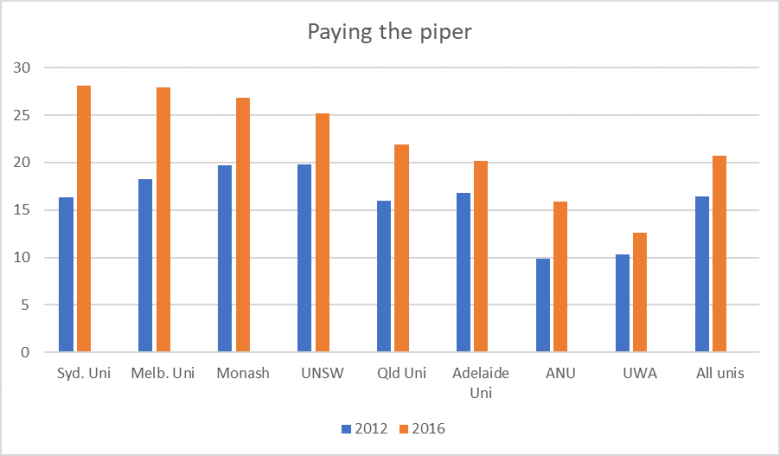
University percentage revenue share from overseas student fees.
Source: Australian Population Research Institute/Department of Education and Training
DEALS AND DOLLARS
MINING DATA
Data Republic co-founder Danny Gilligan, has joined the emerging focus on Asia as an opportunity for Australian fintech companies by opening an office in Singapore. He says Singapore provides a good access point to the rest of Asia because of its reliable regulatory system. "Singapore has always been very good at picking the next big market and positioning itself, whether it is shipping, tourism or financial services and one of the big ones they have identified going forward is the data economy, data exchange and AI," Gilligan told The Australian Financial Review. Data Republic has also won a new round of venture capital funding from a consortium including Australian banks, SingTel Group, Qantas and Singapore Airlines.
RARER EARTHS
Rare earths processor Lynas Corporation is temporarily shutting down production at its politically troubled Malaysian plant potentially affecting global supplies of some inputs for the electronics industry. The Lynas plant, which is one of the few rare earths processors outside China, has been wrongfooted by the new Malaysian government which contains some activists who have opposed the plant on environmental and community grounds. Lynas had sought approval for a production increase and says it needs to shutdown to avoid breaching its licence amid the political wrangling. The government announced new environmental standards for the plant on December 4.
PNG's GAS PUSH
Papua New Guinea is seeking more revenue from the country’s second big gas project amid claims it didn’t get enough revenue from the ground-breaking initial PNG LNG project. Prime Minister Peter O’Neill told a Sydney mining conference he wants a fairer share of benefits from projects after concerns he might have rushed a second project to cash in on the attention generated by the recent APEC Summit in Port Moresby. This new research shows PNG provided a tax subsidy of about $250 million PNG LNG in 2017 which compares with the more than $100 million which Australia spent helping the country host the Summit.
RUDD'S NEW CHINA DEAL
Ecommerce company eCargo, backed by former Prime Minister Kevin Rudd’s daughter Jessica, will buy 85 per cent of supermarket company Metcash’s export business in a deal worth $11 million. eCargo sells Australian food, wine and health products into China. Rudd has also now sold all of her own ecommerce business Jessica’s Suitcase to eCargo after a partial sale earlier in the year.
MOVING OFFSHORE
Plastic packaging firm Pact Group has suggested it will move more of its operations to Asia to avoid rising costs in Australia. The company’s share fell sharply in November when it cut its profit outlook. But chairman Raphael Geminder says its accumulation of Asian production plants over the past ten years means it has an alternative strategy in place.
DIPLOMATICALLY SPEAKING
Prime Minister Scott Morrison at the APEC Summit.
November 18: "There is a lot more pragmatism going on here than people have been prepared to acknowledge in the commentary. There’s a lot of movement under the water, you know, like the duck that’ll paddle pretty quickly."
November 19: "People have got to understand when there isn’t agreement that just means that the dialogue continues. I mean, we’ve got to stop kidding ourselves that everyone’s going to agree all the time. I mean, what family does that happen in?"
WHAT WE’RE READING

And now for a change of pace. With the summer reading season fast approaching, we are turning to our colleagues at the Asia Society Switzerland. They recently did a snap survey of Asia Society Centres around the world for favourite fiction or non-fiction books about Asia. Happy summer reading.
ON THE HORIZON
Prime Minister of India, Narendra Modi. Animation: Rocco Fazzari. View it here.
1,000,000,000 VOTES
Australia may be set for an election in early May next year. But the real festival of democracy will already be underway in India and Indonesia in what will be the biggest display of self-determination in history. More than a combined one billion people will be eligible to vote in Indonesia on April 17 followed by the Indian election, where voting will be drawn out over several weeks around the same time. Voter turnout is likely to be just under 70 per cent of those billion voters which compares very favourably with the much more widely reported US elections where a 50 per cent turnout is seen as good. Indian Prime Minister Narendra Modi and Indonesian President Joko Widodo both seem set to be returned to office which will underpin the new Australian bilateral initiatives underway. But with Asian democracy facing challenges from Myanmar to the Philippines, how the voting proceeds in India and Indonesia will be influential beyond those countries alone.
ONE YEAR ON ...
This is the 12th edition of Briefing MONTHLY - Asia Society Australia’s contribution to deepening the debate about Asia in Australia and filling some of the holes left by a declining Australian media presence in Asia.
This is very much a work in progress and we welcome feedback from readers. But here are some highlights from the journey.
ASIA BRIEFING LIVE
“Morrison revealed to the Asia Briefing Live audience he was meeting PNG Prime Minister Peter O’Neill straight after the speech to announce the joint redevelopment of the Manus Island naval base and increased Australian Federal Police involvement in PNG."
Asia Briefing LIVE is now also an annual Asia Society Australia conference on regional affairs with visiting foreign experts joining top policy makers and commentators from Australia.
DECODING THE DECLARATION
“The official communique from Australia’s special summit with ASEAN leaders contains about 25% more words than the first biennial leadership summit in 2016 in Laos where Prime Minister Malcolm Turnbull invited his fellow leaders to Sydney. But, at five pages, it is a breath of fresh air compared with the 28-page statement the ASEAN leaders released at their own summit last year.”
Briefing MONTHLY provided semi-daily coverage of the March ASEAN Leaders’ summit with news and analysis absent from the mainstream media.
EDUCATING INDONESIA
“A breakthrough on Australian universities providing services in Indonesia is set to be a key feature of the long-awaited trade deal between the two countries. Indonesian Investment minister Tom Lembong said in an interview President Joko Widodo is determined to allow foreign investment in the Indonesian higher education sector in order to improve the employment skills of the country’s youthful population. And Indonesian officials have been discussing how to work this into the Closer Economic Partnership Agreement (CEPA) negotiations.”
From our insider account last December of what would seal the bilateral free trade agreement.
REFLECTIONS OF ASIA @ Powerhouse Museum, Sydney
“When curators were sifting through 10,000 rarely displayed items from Asia collected over more than a century by the Museum of Applied Arts and Sciences they found crates containing two large bronze pieces. Given that the crates were in different storage locations and had different collection dates, no one realised they were two halves of the same incense burner produced by a famous Meiji Japan bronze maker Fujiwara Shigeyoshi.”
Beyond business, Briefing MONTHLY looks at new books and culture in Australia focussed on Asia.
WHERE’S AUSTRALIA?
“Digital entrepreneur Agung Nugroho sold his two-year-old ecommerce platform Kudo to the much larger South-East Asian ride hailing company Grab last year, with a nagging question. Having being partly inspired by an older logistics business Lazarda – then partly run by Australians – Agung noticed there were no Australian investors amongst those interested in recapitalising Kudo. On a recent visit to Sydney he said he couldn’t understand why Australian investors were not more involved in the South-East Asian consumer tech boom when Australia had already successfully produced a company like Atlassian.”
October’s special Briefing MONTHLY focussed on re-engagement with Indonesia.
PASSAGE TO INDIA
“Macquarie Group’s appointment of Shemara Wikramanayake as its new chief executive has provided a serendipitous boost to the new India economic engagement strategy being promoted by former top diplomat Peter Varghese. Wikramanayake, who happens to be of Sri Lankan background, is set to become the go to face for whatever campaign the Federal Government now pursues to raise India’s status as a major future economic partner for Australia.”
Briefing MONTHLY has taken the India Economic Strategy seriously from the beginning.
REPORTING ACADEMIA
“This organisational choice reflects a deeper debate within the academic world about whether Asian knowledge - which is needed in broader Australian institutions - is best delivered by being embedded in various university disciplines or from within Asian studies (or so-called area studies) departments.”
Briefing MONTHLY was the only media platform to report on the largest conference of the Asian Studies Association of Australia in July.
REPORTING BUSINESS
“Cracked abalone shells and missing digits on a video display don’t have much in common. But they capture the essence of the challenge Australian businesses have taking advantage of the new opportunities in Japan.”
Briefing MONTHLY was the only media platform to report this year from each of the conferences held in Australia on doing business with Japan, India and Indonesia.
ABOUT BRIEFING MONTHLY
Briefing MONTHLY is a public update with news and original analysis on Asia and Australia-Asia relations. As Australia debates its future in Asia, and the Australian media footprint in Asia continues to shrink, it is an opportune time to offer Australians at the forefront of Australia’s engagement with Asia a professionally edited, succinct and authoritative curation of the most relevant content on Asia and Australia-Asia relations. Focused on business, geopolitics, education and culture, Briefing MONTHLY is distinctly Australian and internationalist, highlighting trends, deals, visits, stories and events in our region that matter.
Partner with us to help Briefing MONTHLY grow. Exclusive partnership opportunities are available. For more information please contact [email protected]
Read previous issues and subscribe >>

